Case Study Analysis: Mental Health Case of Lisa and TICP Application
VerifiedAdded on 2023/01/17
|13
|3574
|55
Case Study
AI Summary
This case study analysis examines the mental health challenges of a patient named Lisa, focusing on three key issues: loneliness and lack of support, irregularity in medication, and substance abuse (cannabis and speed). The analysis, based on a healthcare interview, highlights how these factors, exacerbated by separation from family and lack of medication adherence, contributed to Lisa's deteriorating mental state. The study applies principles of trauma-informed care and practice (TICP) to discuss how these issues can be addressed through collaborative healthcare interventions, including involving the patient in the care process, facilitating support, and promoting medication adherence. The paper emphasizes the importance of a multidisciplinary approach, including the patient, counselor, and healthcare professionals, to identify and implement effective interventions aimed at improving Lisa's mental health and well-being. The analysis stresses the need for a recovery-oriented approach that empowers the patient to set goals and actively participate in their own care, with the ultimate aim of addressing her mental health concerns and reducing substance abuse.
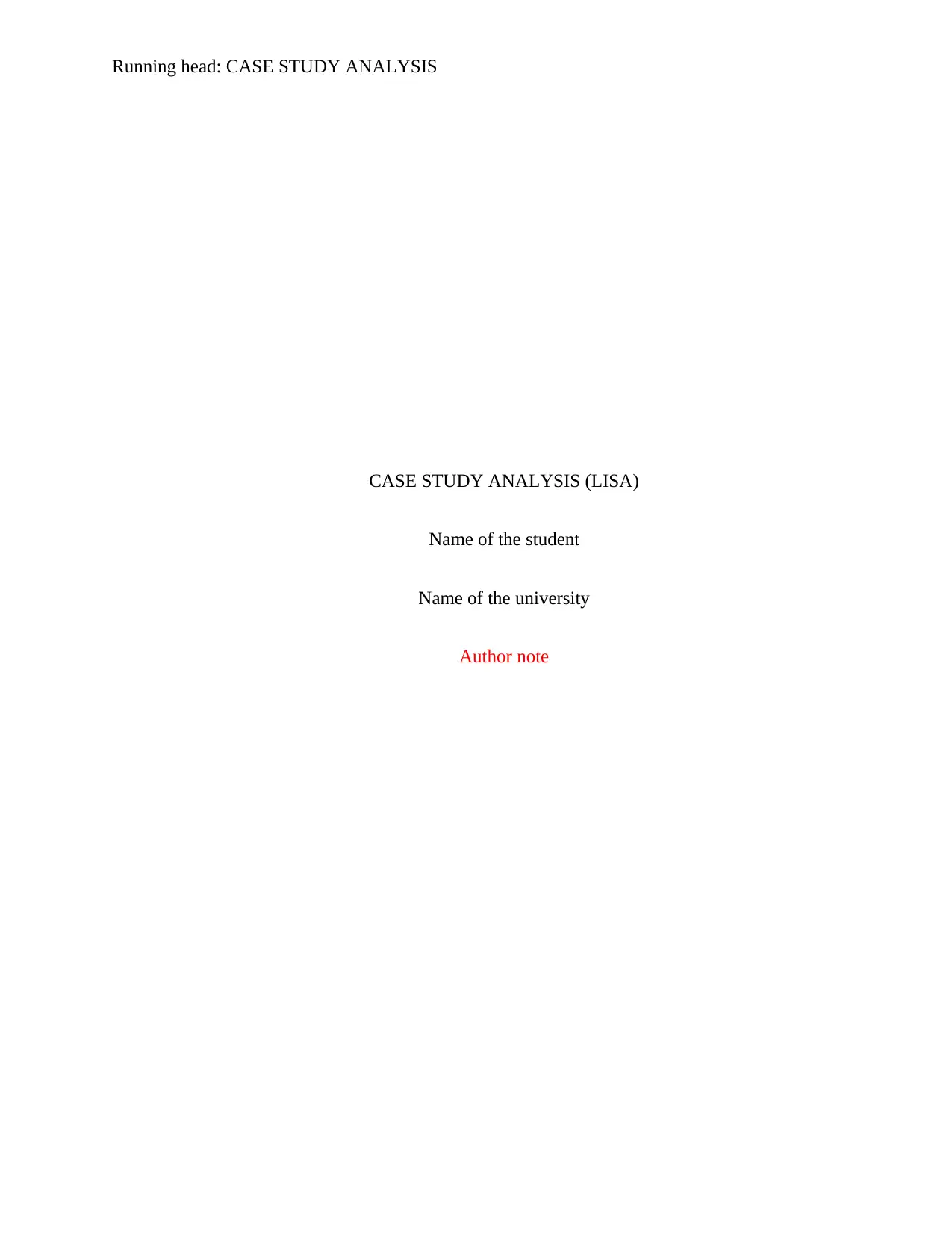
Running head: CASE STUDY ANALYSIS
CASE STUDY ANALYSIS (LISA)
Name of the student
Name of the university
Author note
CASE STUDY ANALYSIS (LISA)
Name of the student
Name of the university
Author note
Paraphrase This Document
Need a fresh take? Get an instant paraphrase of this document with our AI Paraphraser
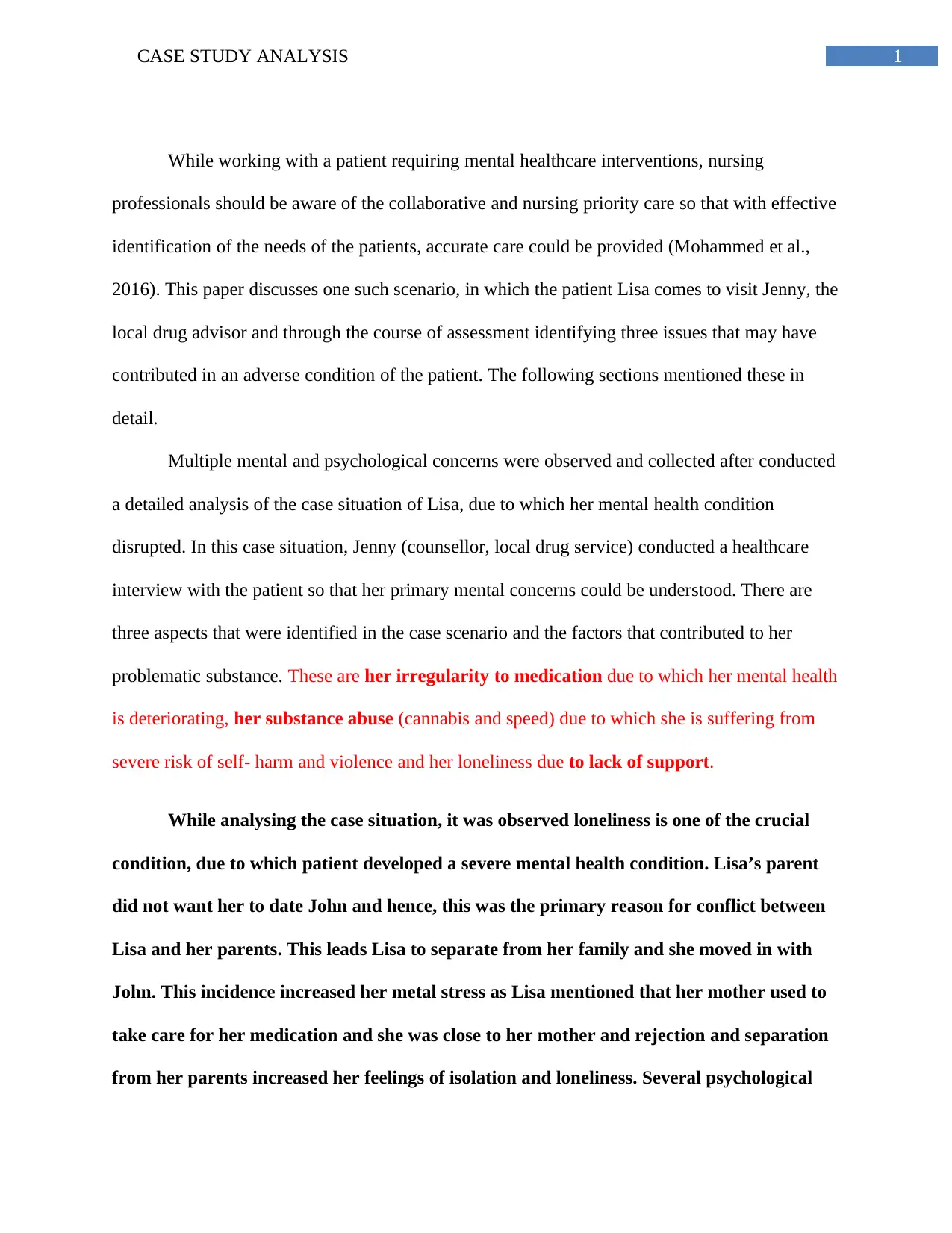
1CASE STUDY ANALYSIS
While working with a patient requiring mental healthcare interventions, nursing
professionals should be aware of the collaborative and nursing priority care so that with effective
identification of the needs of the patients, accurate care could be provided (Mohammed et al.,
2016). This paper discusses one such scenario, in which the patient Lisa comes to visit Jenny, the
local drug advisor and through the course of assessment identifying three issues that may have
contributed in an adverse condition of the patient. The following sections mentioned these in
detail.
Multiple mental and psychological concerns were observed and collected after conducted
a detailed analysis of the case situation of Lisa, due to which her mental health condition
disrupted. In this case situation, Jenny (counsellor, local drug service) conducted a healthcare
interview with the patient so that her primary mental concerns could be understood. There are
three aspects that were identified in the case scenario and the factors that contributed to her
problematic substance. These are her irregularity to medication due to which her mental health
is deteriorating, her substance abuse (cannabis and speed) due to which she is suffering from
severe risk of self- harm and violence and her loneliness due to lack of support.
While analysing the case situation, it was observed loneliness is one of the crucial
condition, due to which patient developed a severe mental health condition. Lisa’s parent
did not want her to date John and hence, this was the primary reason for conflict between
Lisa and her parents. This leads Lisa to separate from her family and she moved in with
John. This incidence increased her metal stress as Lisa mentioned that her mother used to
take care for her medication and she was close to her mother and rejection and separation
from her parents increased her feelings of isolation and loneliness. Several psychological
While working with a patient requiring mental healthcare interventions, nursing
professionals should be aware of the collaborative and nursing priority care so that with effective
identification of the needs of the patients, accurate care could be provided (Mohammed et al.,
2016). This paper discusses one such scenario, in which the patient Lisa comes to visit Jenny, the
local drug advisor and through the course of assessment identifying three issues that may have
contributed in an adverse condition of the patient. The following sections mentioned these in
detail.
Multiple mental and psychological concerns were observed and collected after conducted
a detailed analysis of the case situation of Lisa, due to which her mental health condition
disrupted. In this case situation, Jenny (counsellor, local drug service) conducted a healthcare
interview with the patient so that her primary mental concerns could be understood. There are
three aspects that were identified in the case scenario and the factors that contributed to her
problematic substance. These are her irregularity to medication due to which her mental health
is deteriorating, her substance abuse (cannabis and speed) due to which she is suffering from
severe risk of self- harm and violence and her loneliness due to lack of support.
While analysing the case situation, it was observed loneliness is one of the crucial
condition, due to which patient developed a severe mental health condition. Lisa’s parent
did not want her to date John and hence, this was the primary reason for conflict between
Lisa and her parents. This leads Lisa to separate from her family and she moved in with
John. This incidence increased her metal stress as Lisa mentioned that her mother used to
take care for her medication and she was close to her mother and rejection and separation
from her parents increased her feelings of isolation and loneliness. Several psychological
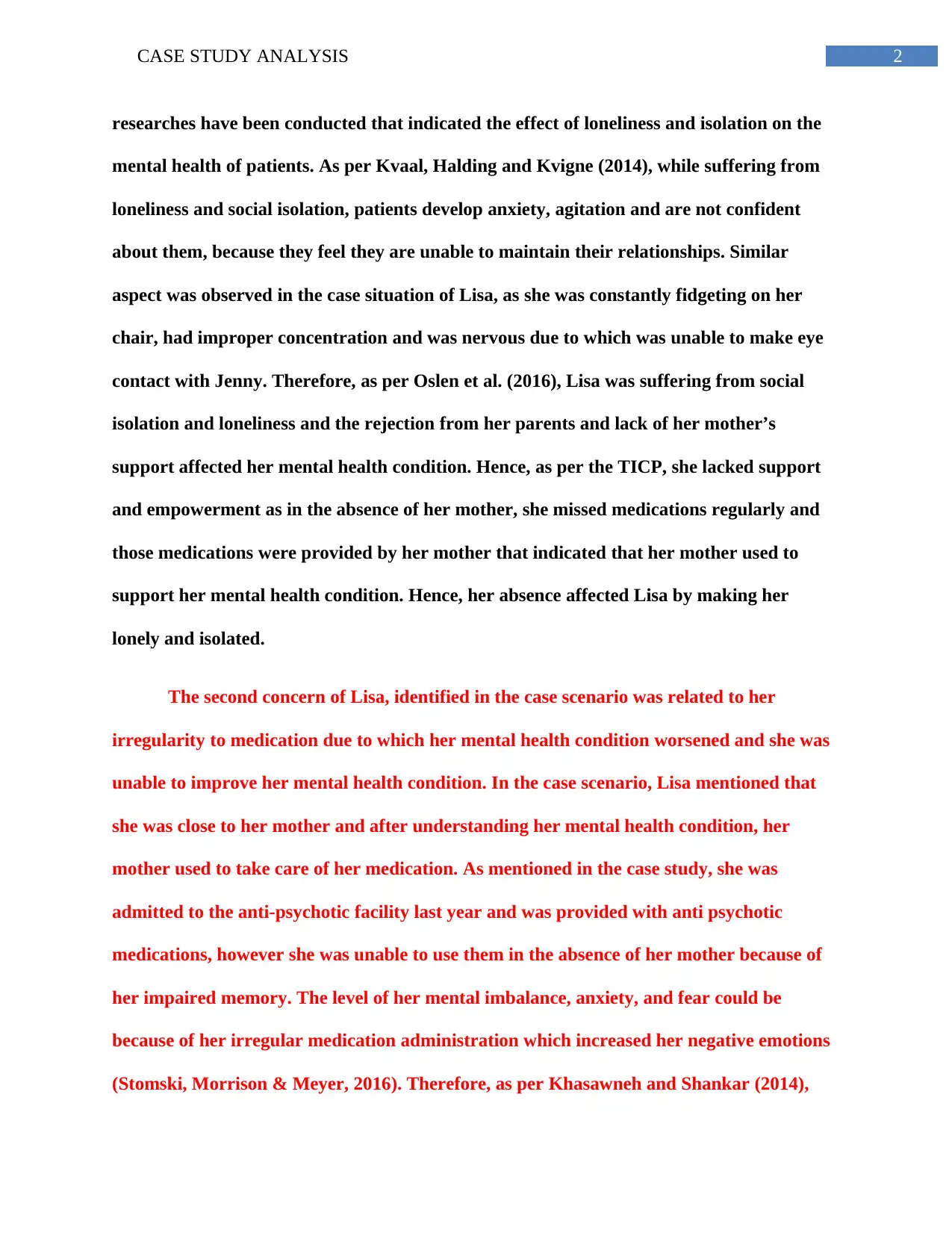
2CASE STUDY ANALYSIS
researches have been conducted that indicated the effect of loneliness and isolation on the
mental health of patients. As per Kvaal, Halding and Kvigne (2014), while suffering from
loneliness and social isolation, patients develop anxiety, agitation and are not confident
about them, because they feel they are unable to maintain their relationships. Similar
aspect was observed in the case situation of Lisa, as she was constantly fidgeting on her
chair, had improper concentration and was nervous due to which was unable to make eye
contact with Jenny. Therefore, as per Oslen et al. (2016), Lisa was suffering from social
isolation and loneliness and the rejection from her parents and lack of her mother’s
support affected her mental health condition. Hence, as per the TICP, she lacked support
and empowerment as in the absence of her mother, she missed medications regularly and
those medications were provided by her mother that indicated that her mother used to
support her mental health condition. Hence, her absence affected Lisa by making her
lonely and isolated.
The second concern of Lisa, identified in the case scenario was related to her
irregularity to medication due to which her mental health condition worsened and she was
unable to improve her mental health condition. In the case scenario, Lisa mentioned that
she was close to her mother and after understanding her mental health condition, her
mother used to take care of her medication. As mentioned in the case study, she was
admitted to the anti-psychotic facility last year and was provided with anti psychotic
medications, however she was unable to use them in the absence of her mother because of
her impaired memory. The level of her mental imbalance, anxiety, and fear could be
because of her irregular medication administration which increased her negative emotions
(Stomski, Morrison & Meyer, 2016). Therefore, as per Khasawneh and Shankar (2014),
researches have been conducted that indicated the effect of loneliness and isolation on the
mental health of patients. As per Kvaal, Halding and Kvigne (2014), while suffering from
loneliness and social isolation, patients develop anxiety, agitation and are not confident
about them, because they feel they are unable to maintain their relationships. Similar
aspect was observed in the case situation of Lisa, as she was constantly fidgeting on her
chair, had improper concentration and was nervous due to which was unable to make eye
contact with Jenny. Therefore, as per Oslen et al. (2016), Lisa was suffering from social
isolation and loneliness and the rejection from her parents and lack of her mother’s
support affected her mental health condition. Hence, as per the TICP, she lacked support
and empowerment as in the absence of her mother, she missed medications regularly and
those medications were provided by her mother that indicated that her mother used to
support her mental health condition. Hence, her absence affected Lisa by making her
lonely and isolated.
The second concern of Lisa, identified in the case scenario was related to her
irregularity to medication due to which her mental health condition worsened and she was
unable to improve her mental health condition. In the case scenario, Lisa mentioned that
she was close to her mother and after understanding her mental health condition, her
mother used to take care of her medication. As mentioned in the case study, she was
admitted to the anti-psychotic facility last year and was provided with anti psychotic
medications, however she was unable to use them in the absence of her mother because of
her impaired memory. The level of her mental imbalance, anxiety, and fear could be
because of her irregular medication administration which increased her negative emotions
(Stomski, Morrison & Meyer, 2016). Therefore, as per Khasawneh and Shankar (2014),
⊘ This is a preview!⊘
Do you want full access?
Subscribe today to unlock all pages.

Trusted by 1+ million students worldwide
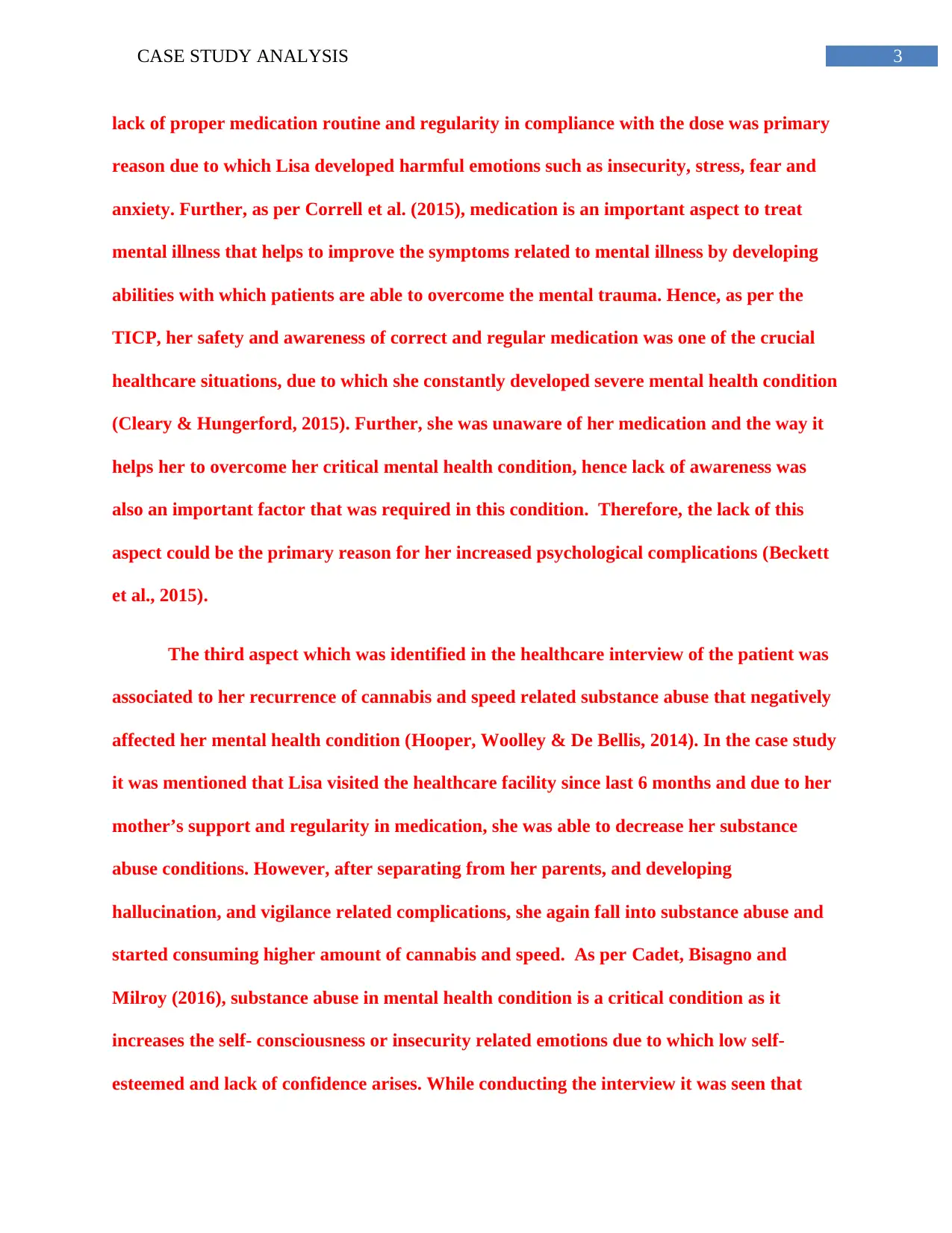
3CASE STUDY ANALYSIS
lack of proper medication routine and regularity in compliance with the dose was primary
reason due to which Lisa developed harmful emotions such as insecurity, stress, fear and
anxiety. Further, as per Correll et al. (2015), medication is an important aspect to treat
mental illness that helps to improve the symptoms related to mental illness by developing
abilities with which patients are able to overcome the mental trauma. Hence, as per the
TICP, her safety and awareness of correct and regular medication was one of the crucial
healthcare situations, due to which she constantly developed severe mental health condition
(Cleary & Hungerford, 2015). Further, she was unaware of her medication and the way it
helps her to overcome her critical mental health condition, hence lack of awareness was
also an important factor that was required in this condition. Therefore, the lack of this
aspect could be the primary reason for her increased psychological complications (Beckett
et al., 2015).
The third aspect which was identified in the healthcare interview of the patient was
associated to her recurrence of cannabis and speed related substance abuse that negatively
affected her mental health condition (Hooper, Woolley & De Bellis, 2014). In the case study
it was mentioned that Lisa visited the healthcare facility since last 6 months and due to her
mother’s support and regularity in medication, she was able to decrease her substance
abuse conditions. However, after separating from her parents, and developing
hallucination, and vigilance related complications, she again fall into substance abuse and
started consuming higher amount of cannabis and speed. As per Cadet, Bisagno and
Milroy (2016), substance abuse in mental health condition is a critical condition as it
increases the self- consciousness or insecurity related emotions due to which low self-
esteemed and lack of confidence arises. While conducting the interview it was seen that
lack of proper medication routine and regularity in compliance with the dose was primary
reason due to which Lisa developed harmful emotions such as insecurity, stress, fear and
anxiety. Further, as per Correll et al. (2015), medication is an important aspect to treat
mental illness that helps to improve the symptoms related to mental illness by developing
abilities with which patients are able to overcome the mental trauma. Hence, as per the
TICP, her safety and awareness of correct and regular medication was one of the crucial
healthcare situations, due to which she constantly developed severe mental health condition
(Cleary & Hungerford, 2015). Further, she was unaware of her medication and the way it
helps her to overcome her critical mental health condition, hence lack of awareness was
also an important factor that was required in this condition. Therefore, the lack of this
aspect could be the primary reason for her increased psychological complications (Beckett
et al., 2015).
The third aspect which was identified in the healthcare interview of the patient was
associated to her recurrence of cannabis and speed related substance abuse that negatively
affected her mental health condition (Hooper, Woolley & De Bellis, 2014). In the case study
it was mentioned that Lisa visited the healthcare facility since last 6 months and due to her
mother’s support and regularity in medication, she was able to decrease her substance
abuse conditions. However, after separating from her parents, and developing
hallucination, and vigilance related complications, she again fall into substance abuse and
started consuming higher amount of cannabis and speed. As per Cadet, Bisagno and
Milroy (2016), substance abuse in mental health condition is a critical condition as it
increases the self- consciousness or insecurity related emotions due to which low self-
esteemed and lack of confidence arises. While conducting the interview it was seen that
Paraphrase This Document
Need a fresh take? Get an instant paraphrase of this document with our AI Paraphraser
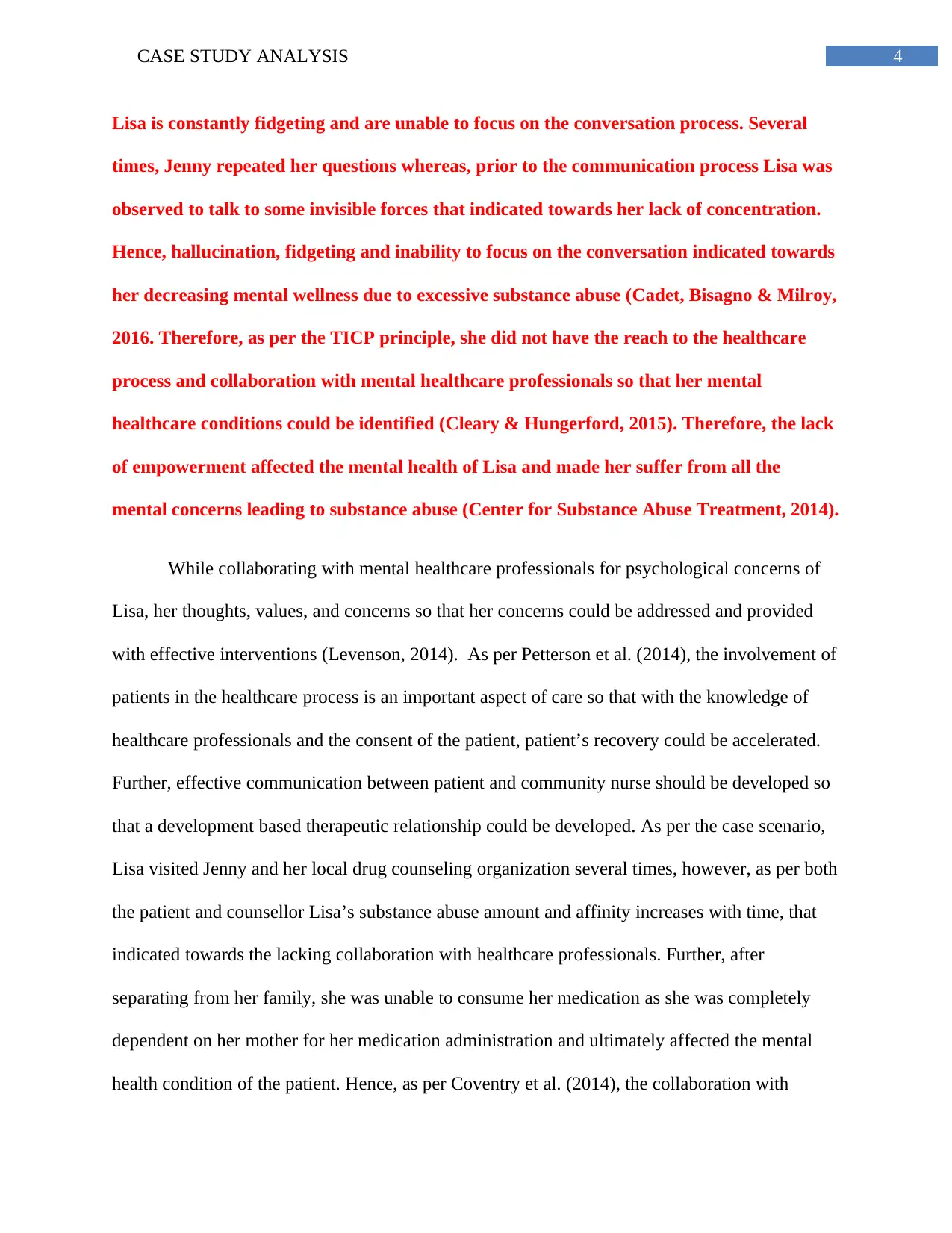
4CASE STUDY ANALYSIS
Lisa is constantly fidgeting and are unable to focus on the conversation process. Several
times, Jenny repeated her questions whereas, prior to the communication process Lisa was
observed to talk to some invisible forces that indicated towards her lack of concentration.
Hence, hallucination, fidgeting and inability to focus on the conversation indicated towards
her decreasing mental wellness due to excessive substance abuse (Cadet, Bisagno & Milroy,
2016. Therefore, as per the TICP principle, she did not have the reach to the healthcare
process and collaboration with mental healthcare professionals so that her mental
healthcare conditions could be identified (Cleary & Hungerford, 2015). Therefore, the lack
of empowerment affected the mental health of Lisa and made her suffer from all the
mental concerns leading to substance abuse (Center for Substance Abuse Treatment, 2014).
While collaborating with mental healthcare professionals for psychological concerns of
Lisa, her thoughts, values, and concerns so that her concerns could be addressed and provided
with effective interventions (Levenson, 2014). As per Petterson et al. (2014), the involvement of
patients in the healthcare process is an important aspect of care so that with the knowledge of
healthcare professionals and the consent of the patient, patient’s recovery could be accelerated.
Further, effective communication between patient and community nurse should be developed so
that a development based therapeutic relationship could be developed. As per the case scenario,
Lisa visited Jenny and her local drug counseling organization several times, however, as per both
the patient and counsellor Lisa’s substance abuse amount and affinity increases with time, that
indicated towards the lacking collaboration with healthcare professionals. Further, after
separating from her family, she was unable to consume her medication as she was completely
dependent on her mother for her medication administration and ultimately affected the mental
health condition of the patient. Hence, as per Coventry et al. (2014), the collaboration with
Lisa is constantly fidgeting and are unable to focus on the conversation process. Several
times, Jenny repeated her questions whereas, prior to the communication process Lisa was
observed to talk to some invisible forces that indicated towards her lack of concentration.
Hence, hallucination, fidgeting and inability to focus on the conversation indicated towards
her decreasing mental wellness due to excessive substance abuse (Cadet, Bisagno & Milroy,
2016. Therefore, as per the TICP principle, she did not have the reach to the healthcare
process and collaboration with mental healthcare professionals so that her mental
healthcare conditions could be identified (Cleary & Hungerford, 2015). Therefore, the lack
of empowerment affected the mental health of Lisa and made her suffer from all the
mental concerns leading to substance abuse (Center for Substance Abuse Treatment, 2014).
While collaborating with mental healthcare professionals for psychological concerns of
Lisa, her thoughts, values, and concerns so that her concerns could be addressed and provided
with effective interventions (Levenson, 2014). As per Petterson et al. (2014), the involvement of
patients in the healthcare process is an important aspect of care so that with the knowledge of
healthcare professionals and the consent of the patient, patient’s recovery could be accelerated.
Further, effective communication between patient and community nurse should be developed so
that a development based therapeutic relationship could be developed. As per the case scenario,
Lisa visited Jenny and her local drug counseling organization several times, however, as per both
the patient and counsellor Lisa’s substance abuse amount and affinity increases with time, that
indicated towards the lacking collaboration with healthcare professionals. Further, after
separating from her family, she was unable to consume her medication as she was completely
dependent on her mother for her medication administration and ultimately affected the mental
health condition of the patient. Hence, as per Coventry et al. (2014), the collaboration with
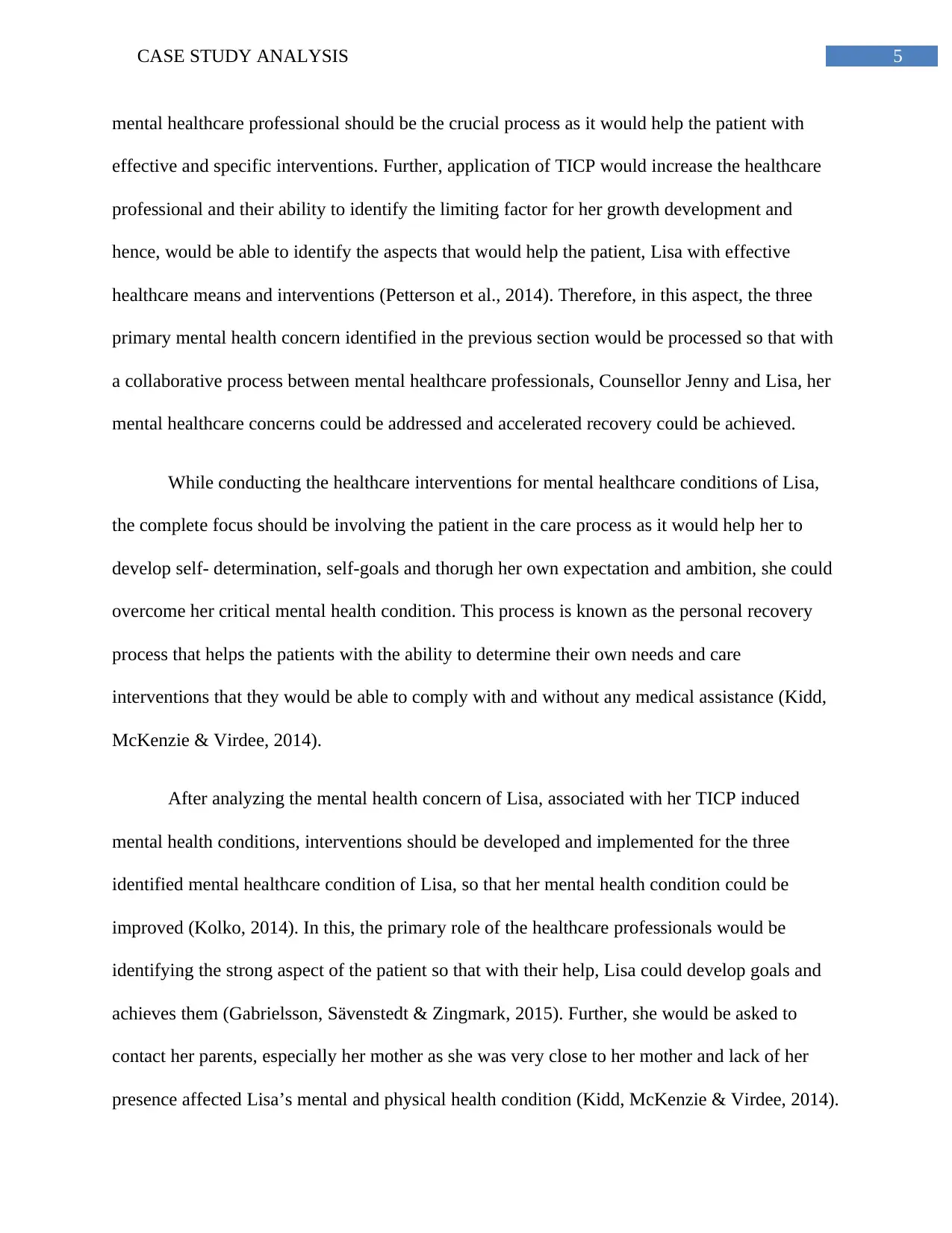
5CASE STUDY ANALYSIS
mental healthcare professional should be the crucial process as it would help the patient with
effective and specific interventions. Further, application of TICP would increase the healthcare
professional and their ability to identify the limiting factor for her growth development and
hence, would be able to identify the aspects that would help the patient, Lisa with effective
healthcare means and interventions (Petterson et al., 2014). Therefore, in this aspect, the three
primary mental health concern identified in the previous section would be processed so that with
a collaborative process between mental healthcare professionals, Counsellor Jenny and Lisa, her
mental healthcare concerns could be addressed and accelerated recovery could be achieved.
While conducting the healthcare interventions for mental healthcare conditions of Lisa,
the complete focus should be involving the patient in the care process as it would help her to
develop self- determination, self-goals and thorugh her own expectation and ambition, she could
overcome her critical mental health condition. This process is known as the personal recovery
process that helps the patients with the ability to determine their own needs and care
interventions that they would be able to comply with and without any medical assistance (Kidd,
McKenzie & Virdee, 2014).
After analyzing the mental health concern of Lisa, associated with her TICP induced
mental health conditions, interventions should be developed and implemented for the three
identified mental healthcare condition of Lisa, so that her mental health condition could be
improved (Kolko, 2014). In this, the primary role of the healthcare professionals would be
identifying the strong aspect of the patient so that with their help, Lisa could develop goals and
achieves them (Gabrielsson, Sävenstedt & Zingmark, 2015). Further, she would be asked to
contact her parents, especially her mother as she was very close to her mother and lack of her
presence affected Lisa’s mental and physical health condition (Kidd, McKenzie & Virdee, 2014).
mental healthcare professional should be the crucial process as it would help the patient with
effective and specific interventions. Further, application of TICP would increase the healthcare
professional and their ability to identify the limiting factor for her growth development and
hence, would be able to identify the aspects that would help the patient, Lisa with effective
healthcare means and interventions (Petterson et al., 2014). Therefore, in this aspect, the three
primary mental health concern identified in the previous section would be processed so that with
a collaborative process between mental healthcare professionals, Counsellor Jenny and Lisa, her
mental healthcare concerns could be addressed and accelerated recovery could be achieved.
While conducting the healthcare interventions for mental healthcare conditions of Lisa,
the complete focus should be involving the patient in the care process as it would help her to
develop self- determination, self-goals and thorugh her own expectation and ambition, she could
overcome her critical mental health condition. This process is known as the personal recovery
process that helps the patients with the ability to determine their own needs and care
interventions that they would be able to comply with and without any medical assistance (Kidd,
McKenzie & Virdee, 2014).
After analyzing the mental health concern of Lisa, associated with her TICP induced
mental health conditions, interventions should be developed and implemented for the three
identified mental healthcare condition of Lisa, so that her mental health condition could be
improved (Kolko, 2014). In this, the primary role of the healthcare professionals would be
identifying the strong aspect of the patient so that with their help, Lisa could develop goals and
achieves them (Gabrielsson, Sävenstedt & Zingmark, 2015). Further, she would be asked to
contact her parents, especially her mother as she was very close to her mother and lack of her
presence affected Lisa’s mental and physical health condition (Kidd, McKenzie & Virdee, 2014).
⊘ This is a preview!⊘
Do you want full access?
Subscribe today to unlock all pages.

Trusted by 1+ million students worldwide
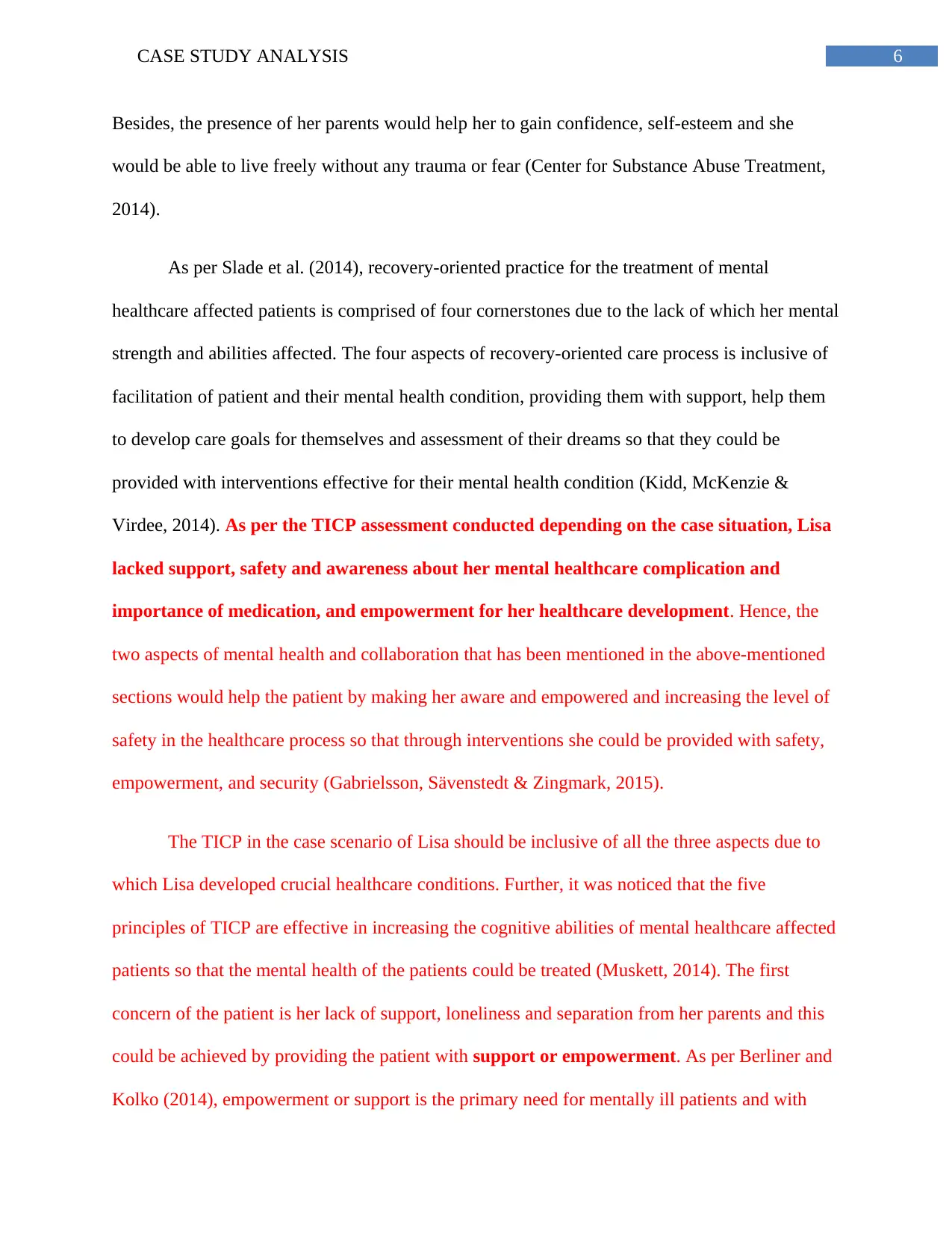
6CASE STUDY ANALYSIS
Besides, the presence of her parents would help her to gain confidence, self-esteem and she
would be able to live freely without any trauma or fear (Center for Substance Abuse Treatment,
2014).
As per Slade et al. (2014), recovery-oriented practice for the treatment of mental
healthcare affected patients is comprised of four cornerstones due to the lack of which her mental
strength and abilities affected. The four aspects of recovery-oriented care process is inclusive of
facilitation of patient and their mental health condition, providing them with support, help them
to develop care goals for themselves and assessment of their dreams so that they could be
provided with interventions effective for their mental health condition (Kidd, McKenzie &
Virdee, 2014). As per the TICP assessment conducted depending on the case situation, Lisa
lacked support, safety and awareness about her mental healthcare complication and
importance of medication, and empowerment for her healthcare development. Hence, the
two aspects of mental health and collaboration that has been mentioned in the above-mentioned
sections would help the patient by making her aware and empowered and increasing the level of
safety in the healthcare process so that through interventions she could be provided with safety,
empowerment, and security (Gabrielsson, Sävenstedt & Zingmark, 2015).
The TICP in the case scenario of Lisa should be inclusive of all the three aspects due to
which Lisa developed crucial healthcare conditions. Further, it was noticed that the five
principles of TICP are effective in increasing the cognitive abilities of mental healthcare affected
patients so that the mental health of the patients could be treated (Muskett, 2014). The first
concern of the patient is her lack of support, loneliness and separation from her parents and this
could be achieved by providing the patient with support or empowerment. As per Berliner and
Kolko (2014), empowerment or support is the primary need for mentally ill patients and with
Besides, the presence of her parents would help her to gain confidence, self-esteem and she
would be able to live freely without any trauma or fear (Center for Substance Abuse Treatment,
2014).
As per Slade et al. (2014), recovery-oriented practice for the treatment of mental
healthcare affected patients is comprised of four cornerstones due to the lack of which her mental
strength and abilities affected. The four aspects of recovery-oriented care process is inclusive of
facilitation of patient and their mental health condition, providing them with support, help them
to develop care goals for themselves and assessment of their dreams so that they could be
provided with interventions effective for their mental health condition (Kidd, McKenzie &
Virdee, 2014). As per the TICP assessment conducted depending on the case situation, Lisa
lacked support, safety and awareness about her mental healthcare complication and
importance of medication, and empowerment for her healthcare development. Hence, the
two aspects of mental health and collaboration that has been mentioned in the above-mentioned
sections would help the patient by making her aware and empowered and increasing the level of
safety in the healthcare process so that through interventions she could be provided with safety,
empowerment, and security (Gabrielsson, Sävenstedt & Zingmark, 2015).
The TICP in the case scenario of Lisa should be inclusive of all the three aspects due to
which Lisa developed crucial healthcare conditions. Further, it was noticed that the five
principles of TICP are effective in increasing the cognitive abilities of mental healthcare affected
patients so that the mental health of the patients could be treated (Muskett, 2014). The first
concern of the patient is her lack of support, loneliness and separation from her parents and this
could be achieved by providing the patient with support or empowerment. As per Berliner and
Kolko (2014), empowerment or support is the primary need for mentally ill patients and with
Paraphrase This Document
Need a fresh take? Get an instant paraphrase of this document with our AI Paraphraser
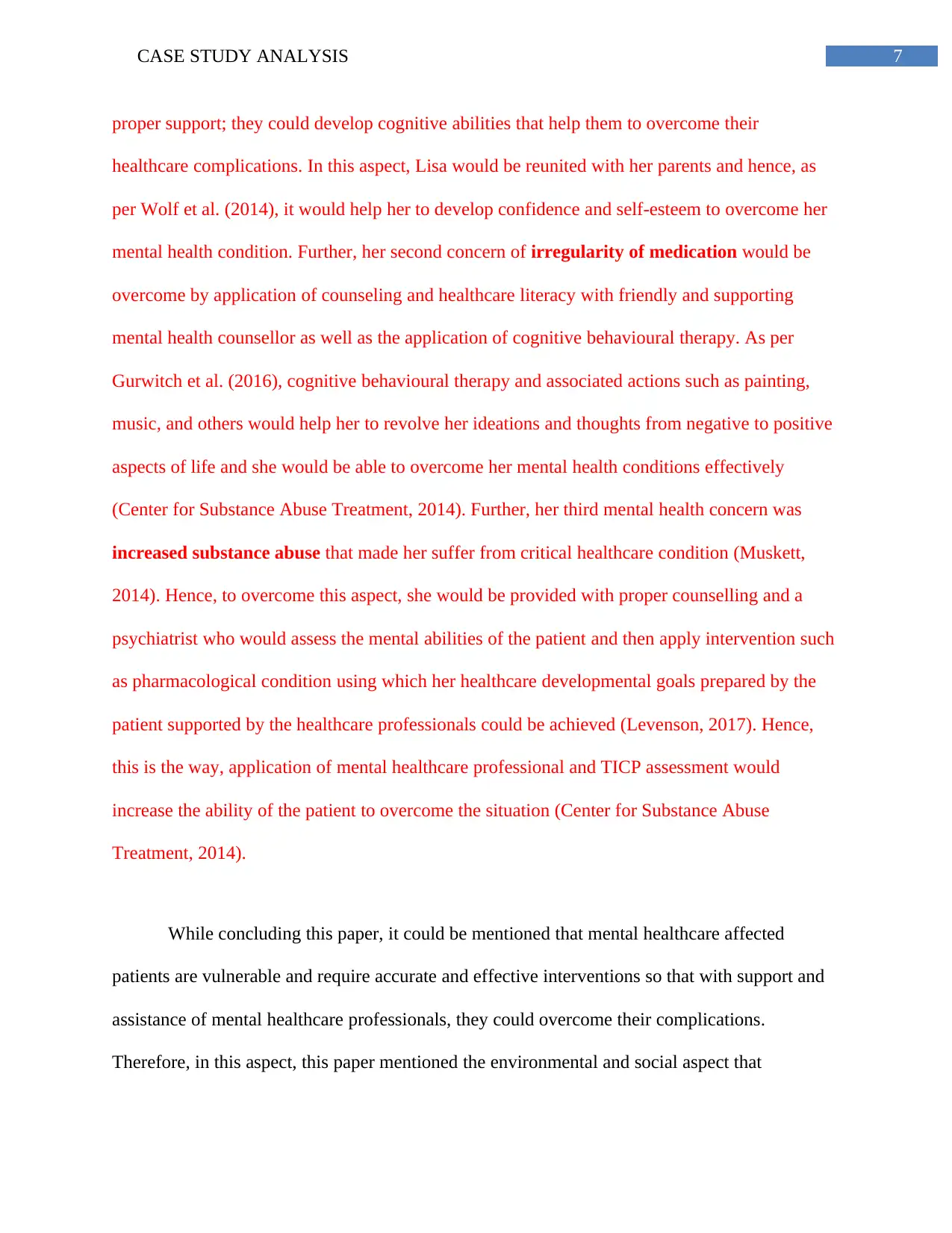
7CASE STUDY ANALYSIS
proper support; they could develop cognitive abilities that help them to overcome their
healthcare complications. In this aspect, Lisa would be reunited with her parents and hence, as
per Wolf et al. (2014), it would help her to develop confidence and self-esteem to overcome her
mental health condition. Further, her second concern of irregularity of medication would be
overcome by application of counseling and healthcare literacy with friendly and supporting
mental health counsellor as well as the application of cognitive behavioural therapy. As per
Gurwitch et al. (2016), cognitive behavioural therapy and associated actions such as painting,
music, and others would help her to revolve her ideations and thoughts from negative to positive
aspects of life and she would be able to overcome her mental health conditions effectively
(Center for Substance Abuse Treatment, 2014). Further, her third mental health concern was
increased substance abuse that made her suffer from critical healthcare condition (Muskett,
2014). Hence, to overcome this aspect, she would be provided with proper counselling and a
psychiatrist who would assess the mental abilities of the patient and then apply intervention such
as pharmacological condition using which her healthcare developmental goals prepared by the
patient supported by the healthcare professionals could be achieved (Levenson, 2017). Hence,
this is the way, application of mental healthcare professional and TICP assessment would
increase the ability of the patient to overcome the situation (Center for Substance Abuse
Treatment, 2014).
While concluding this paper, it could be mentioned that mental healthcare affected
patients are vulnerable and require accurate and effective interventions so that with support and
assistance of mental healthcare professionals, they could overcome their complications.
Therefore, in this aspect, this paper mentioned the environmental and social aspect that
proper support; they could develop cognitive abilities that help them to overcome their
healthcare complications. In this aspect, Lisa would be reunited with her parents and hence, as
per Wolf et al. (2014), it would help her to develop confidence and self-esteem to overcome her
mental health condition. Further, her second concern of irregularity of medication would be
overcome by application of counseling and healthcare literacy with friendly and supporting
mental health counsellor as well as the application of cognitive behavioural therapy. As per
Gurwitch et al. (2016), cognitive behavioural therapy and associated actions such as painting,
music, and others would help her to revolve her ideations and thoughts from negative to positive
aspects of life and she would be able to overcome her mental health conditions effectively
(Center for Substance Abuse Treatment, 2014). Further, her third mental health concern was
increased substance abuse that made her suffer from critical healthcare condition (Muskett,
2014). Hence, to overcome this aspect, she would be provided with proper counselling and a
psychiatrist who would assess the mental abilities of the patient and then apply intervention such
as pharmacological condition using which her healthcare developmental goals prepared by the
patient supported by the healthcare professionals could be achieved (Levenson, 2017). Hence,
this is the way, application of mental healthcare professional and TICP assessment would
increase the ability of the patient to overcome the situation (Center for Substance Abuse
Treatment, 2014).
While concluding this paper, it could be mentioned that mental healthcare affected
patients are vulnerable and require accurate and effective interventions so that with support and
assistance of mental healthcare professionals, they could overcome their complications.
Therefore, in this aspect, this paper mentioned the environmental and social aspect that

8CASE STUDY ANALYSIS
contributed to her care process. Further, the interventions that were applied with the help of
trauma-informed care practice were also mentioned in this analytical paper.
contributed to her care process. Further, the interventions that were applied with the help of
trauma-informed care practice were also mentioned in this analytical paper.
⊘ This is a preview!⊘
Do you want full access?
Subscribe today to unlock all pages.

Trusted by 1+ million students worldwide
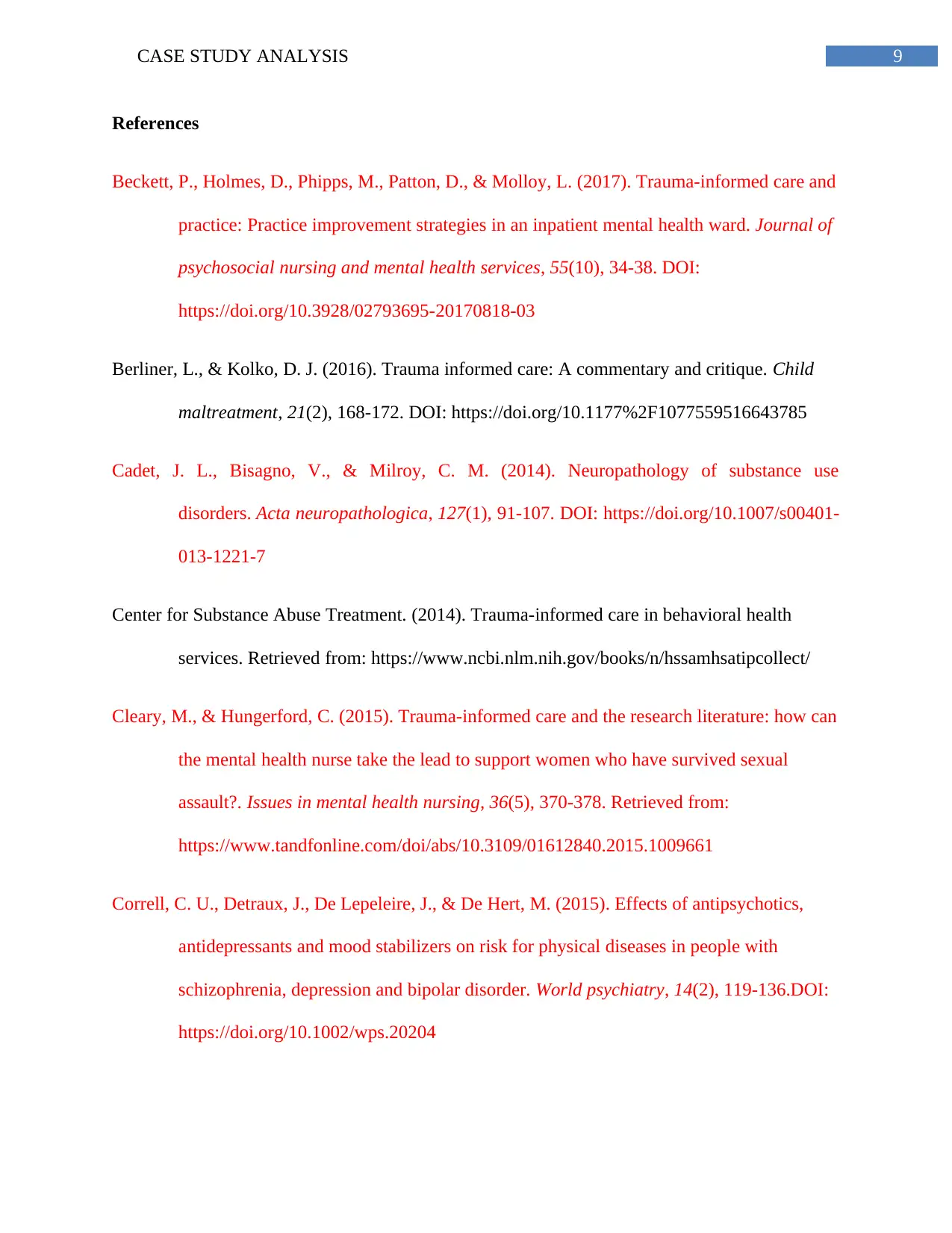
9CASE STUDY ANALYSIS
References
Beckett, P., Holmes, D., Phipps, M., Patton, D., & Molloy, L. (2017). Trauma-informed care and
practice: Practice improvement strategies in an inpatient mental health ward. Journal of
psychosocial nursing and mental health services, 55(10), 34-38. DOI:
https://doi.org/10.3928/02793695-20170818-03
Berliner, L., & Kolko, D. J. (2016). Trauma informed care: A commentary and critique. Child
maltreatment, 21(2), 168-172. DOI: https://doi.org/10.1177%2F1077559516643785
Cadet, J. L., Bisagno, V., & Milroy, C. M. (2014). Neuropathology of substance use
disorders. Acta neuropathologica, 127(1), 91-107. DOI: https://doi.org/10.1007/s00401-
013-1221-7
Center for Substance Abuse Treatment. (2014). Trauma-informed care in behavioral health
services. Retrieved from: https://www.ncbi.nlm.nih.gov/books/n/hssamhsatipcollect/
Cleary, M., & Hungerford, C. (2015). Trauma-informed care and the research literature: how can
the mental health nurse take the lead to support women who have survived sexual
assault?. Issues in mental health nursing, 36(5), 370-378. Retrieved from:
https://www.tandfonline.com/doi/abs/10.3109/01612840.2015.1009661
Correll, C. U., Detraux, J., De Lepeleire, J., & De Hert, M. (2015). Effects of antipsychotics,
antidepressants and mood stabilizers on risk for physical diseases in people with
schizophrenia, depression and bipolar disorder. World psychiatry, 14(2), 119-136.DOI:
https://doi.org/10.1002/wps.20204
References
Beckett, P., Holmes, D., Phipps, M., Patton, D., & Molloy, L. (2017). Trauma-informed care and
practice: Practice improvement strategies in an inpatient mental health ward. Journal of
psychosocial nursing and mental health services, 55(10), 34-38. DOI:
https://doi.org/10.3928/02793695-20170818-03
Berliner, L., & Kolko, D. J. (2016). Trauma informed care: A commentary and critique. Child
maltreatment, 21(2), 168-172. DOI: https://doi.org/10.1177%2F1077559516643785
Cadet, J. L., Bisagno, V., & Milroy, C. M. (2014). Neuropathology of substance use
disorders. Acta neuropathologica, 127(1), 91-107. DOI: https://doi.org/10.1007/s00401-
013-1221-7
Center for Substance Abuse Treatment. (2014). Trauma-informed care in behavioral health
services. Retrieved from: https://www.ncbi.nlm.nih.gov/books/n/hssamhsatipcollect/
Cleary, M., & Hungerford, C. (2015). Trauma-informed care and the research literature: how can
the mental health nurse take the lead to support women who have survived sexual
assault?. Issues in mental health nursing, 36(5), 370-378. Retrieved from:
https://www.tandfonline.com/doi/abs/10.3109/01612840.2015.1009661
Correll, C. U., Detraux, J., De Lepeleire, J., & De Hert, M. (2015). Effects of antipsychotics,
antidepressants and mood stabilizers on risk for physical diseases in people with
schizophrenia, depression and bipolar disorder. World psychiatry, 14(2), 119-136.DOI:
https://doi.org/10.1002/wps.20204
Paraphrase This Document
Need a fresh take? Get an instant paraphrase of this document with our AI Paraphraser
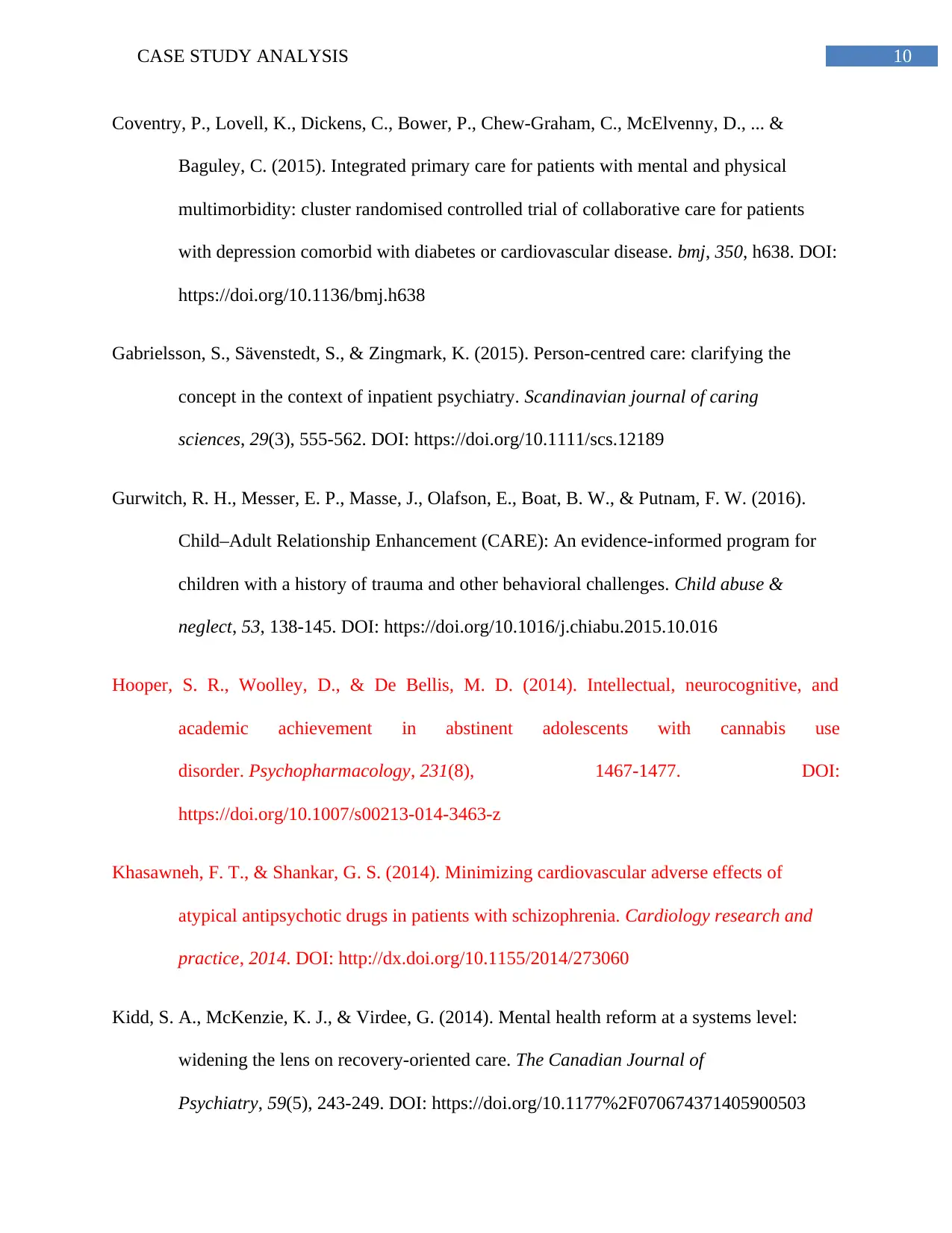
10CASE STUDY ANALYSIS
Coventry, P., Lovell, K., Dickens, C., Bower, P., Chew-Graham, C., McElvenny, D., ... &
Baguley, C. (2015). Integrated primary care for patients with mental and physical
multimorbidity: cluster randomised controlled trial of collaborative care for patients
with depression comorbid with diabetes or cardiovascular disease. bmj, 350, h638. DOI:
https://doi.org/10.1136/bmj.h638
Gabrielsson, S., Sävenstedt, S., & Zingmark, K. (2015). Person‐centred care: clarifying the
concept in the context of inpatient psychiatry. Scandinavian journal of caring
sciences, 29(3), 555-562. DOI: https://doi.org/10.1111/scs.12189
Gurwitch, R. H., Messer, E. P., Masse, J., Olafson, E., Boat, B. W., & Putnam, F. W. (2016).
Child–Adult Relationship Enhancement (CARE): An evidence-informed program for
children with a history of trauma and other behavioral challenges. Child abuse &
neglect, 53, 138-145. DOI: https://doi.org/10.1016/j.chiabu.2015.10.016
Hooper, S. R., Woolley, D., & De Bellis, M. D. (2014). Intellectual, neurocognitive, and
academic achievement in abstinent adolescents with cannabis use
disorder. Psychopharmacology, 231(8), 1467-1477. DOI:
https://doi.org/10.1007/s00213-014-3463-z
Khasawneh, F. T., & Shankar, G. S. (2014). Minimizing cardiovascular adverse effects of
atypical antipsychotic drugs in patients with schizophrenia. Cardiology research and
practice, 2014. DOI: http://dx.doi.org/10.1155/2014/273060
Kidd, S. A., McKenzie, K. J., & Virdee, G. (2014). Mental health reform at a systems level:
widening the lens on recovery-oriented care. The Canadian Journal of
Psychiatry, 59(5), 243-249. DOI: https://doi.org/10.1177%2F070674371405900503
Coventry, P., Lovell, K., Dickens, C., Bower, P., Chew-Graham, C., McElvenny, D., ... &
Baguley, C. (2015). Integrated primary care for patients with mental and physical
multimorbidity: cluster randomised controlled trial of collaborative care for patients
with depression comorbid with diabetes or cardiovascular disease. bmj, 350, h638. DOI:
https://doi.org/10.1136/bmj.h638
Gabrielsson, S., Sävenstedt, S., & Zingmark, K. (2015). Person‐centred care: clarifying the
concept in the context of inpatient psychiatry. Scandinavian journal of caring
sciences, 29(3), 555-562. DOI: https://doi.org/10.1111/scs.12189
Gurwitch, R. H., Messer, E. P., Masse, J., Olafson, E., Boat, B. W., & Putnam, F. W. (2016).
Child–Adult Relationship Enhancement (CARE): An evidence-informed program for
children with a history of trauma and other behavioral challenges. Child abuse &
neglect, 53, 138-145. DOI: https://doi.org/10.1016/j.chiabu.2015.10.016
Hooper, S. R., Woolley, D., & De Bellis, M. D. (2014). Intellectual, neurocognitive, and
academic achievement in abstinent adolescents with cannabis use
disorder. Psychopharmacology, 231(8), 1467-1477. DOI:
https://doi.org/10.1007/s00213-014-3463-z
Khasawneh, F. T., & Shankar, G. S. (2014). Minimizing cardiovascular adverse effects of
atypical antipsychotic drugs in patients with schizophrenia. Cardiology research and
practice, 2014. DOI: http://dx.doi.org/10.1155/2014/273060
Kidd, S. A., McKenzie, K. J., & Virdee, G. (2014). Mental health reform at a systems level:
widening the lens on recovery-oriented care. The Canadian Journal of
Psychiatry, 59(5), 243-249. DOI: https://doi.org/10.1177%2F070674371405900503
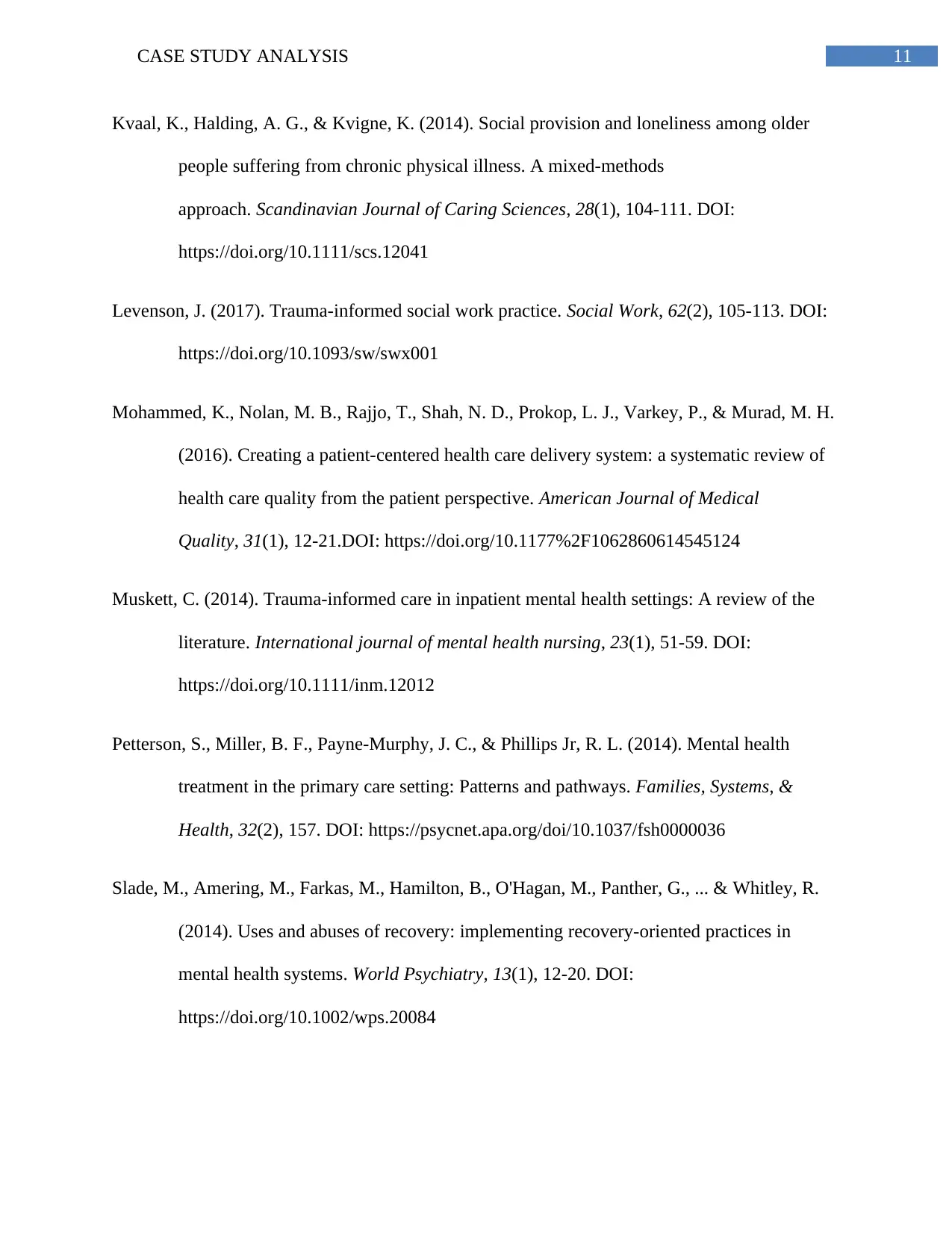
11CASE STUDY ANALYSIS
Kvaal, K., Halding, A. G., & Kvigne, K. (2014). Social provision and loneliness among older
people suffering from chronic physical illness. A mixed‐methods
approach. Scandinavian Journal of Caring Sciences, 28(1), 104-111. DOI:
https://doi.org/10.1111/scs.12041
Levenson, J. (2017). Trauma-informed social work practice. Social Work, 62(2), 105-113. DOI:
https://doi.org/10.1093/sw/swx001
Mohammed, K., Nolan, M. B., Rajjo, T., Shah, N. D., Prokop, L. J., Varkey, P., & Murad, M. H.
(2016). Creating a patient-centered health care delivery system: a systematic review of
health care quality from the patient perspective. American Journal of Medical
Quality, 31(1), 12-21.DOI: https://doi.org/10.1177%2F1062860614545124
Muskett, C. (2014). Trauma‐informed care in inpatient mental health settings: A review of the
literature. International journal of mental health nursing, 23(1), 51-59. DOI:
https://doi.org/10.1111/inm.12012
Petterson, S., Miller, B. F., Payne-Murphy, J. C., & Phillips Jr, R. L. (2014). Mental health
treatment in the primary care setting: Patterns and pathways. Families, Systems, &
Health, 32(2), 157. DOI: https://psycnet.apa.org/doi/10.1037/fsh0000036
Slade, M., Amering, M., Farkas, M., Hamilton, B., O'Hagan, M., Panther, G., ... & Whitley, R.
(2014). Uses and abuses of recovery: implementing recovery‐oriented practices in
mental health systems. World Psychiatry, 13(1), 12-20. DOI:
https://doi.org/10.1002/wps.20084
Kvaal, K., Halding, A. G., & Kvigne, K. (2014). Social provision and loneliness among older
people suffering from chronic physical illness. A mixed‐methods
approach. Scandinavian Journal of Caring Sciences, 28(1), 104-111. DOI:
https://doi.org/10.1111/scs.12041
Levenson, J. (2017). Trauma-informed social work practice. Social Work, 62(2), 105-113. DOI:
https://doi.org/10.1093/sw/swx001
Mohammed, K., Nolan, M. B., Rajjo, T., Shah, N. D., Prokop, L. J., Varkey, P., & Murad, M. H.
(2016). Creating a patient-centered health care delivery system: a systematic review of
health care quality from the patient perspective. American Journal of Medical
Quality, 31(1), 12-21.DOI: https://doi.org/10.1177%2F1062860614545124
Muskett, C. (2014). Trauma‐informed care in inpatient mental health settings: A review of the
literature. International journal of mental health nursing, 23(1), 51-59. DOI:
https://doi.org/10.1111/inm.12012
Petterson, S., Miller, B. F., Payne-Murphy, J. C., & Phillips Jr, R. L. (2014). Mental health
treatment in the primary care setting: Patterns and pathways. Families, Systems, &
Health, 32(2), 157. DOI: https://psycnet.apa.org/doi/10.1037/fsh0000036
Slade, M., Amering, M., Farkas, M., Hamilton, B., O'Hagan, M., Panther, G., ... & Whitley, R.
(2014). Uses and abuses of recovery: implementing recovery‐oriented practices in
mental health systems. World Psychiatry, 13(1), 12-20. DOI:
https://doi.org/10.1002/wps.20084
⊘ This is a preview!⊘
Do you want full access?
Subscribe today to unlock all pages.

Trusted by 1+ million students worldwide
1 out of 13
Related Documents
Your All-in-One AI-Powered Toolkit for Academic Success.
+13062052269
info@desklib.com
Available 24*7 on WhatsApp / Email
![[object Object]](/_next/static/media/star-bottom.7253800d.svg)
Unlock your academic potential
Copyright © 2020–2026 A2Z Services. All Rights Reserved. Developed and managed by ZUCOL.
![Mental Health Nursing Assignment: Lisa Case Study, [University Name]](/_next/image/?url=https%3A%2F%2Fdesklib.com%2Fmedia%2Fimages%2Fpe%2F5e790301b8374363b0168e51e06aa3a5.jpg&w=256&q=75)




